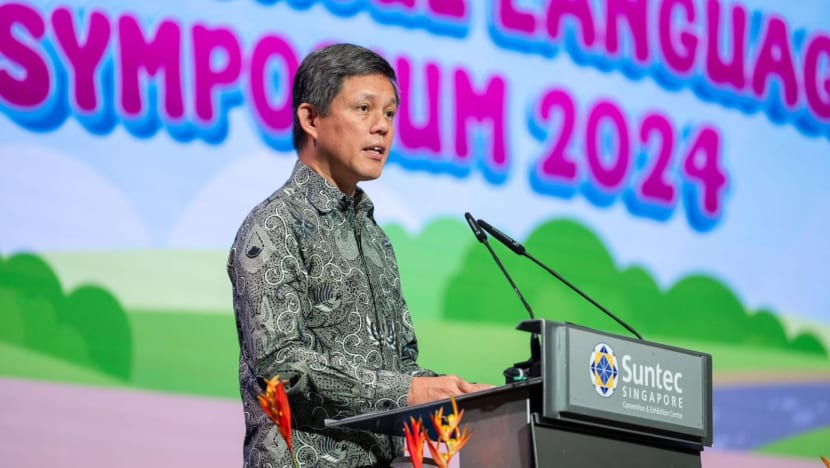More students will be allowed to take up Higher Mother Tongue in secondary 1 from 2026

Minister for Education Chan Chun Sing speaks at the Mother Tongue Languages Symposium 2024 on Sep 14, 2024. (Photo: Facebook/Chan Chun Sing)

This audio is generated by an AI tool.
SINGAPORE: Students who do well in their Mother Tongue Language at the Primary School Leaving Examination (PSLE) will be given the chance to study Higher Mother Tongue at Secondary 1 from 2026, regardless of their PSLE overall score.
Currently, students must obtain either a PSLE overall score of 8 or better. They also qualify if they get an overall score of 9 to 14 with a Mother Tongue (MTL) score of AL1/AL2 or at least a merit in Higher Mother Tongue (HMTL).
But from 2026, they can take up Higher Mother Tongue as a subject in secondary school as long as they obtain AL1/AL2 in their Mother Tongue at the PSLE, or a distinction or merit in Higher Mother Tongue, said Minister for Education Chan Chun Sing on Saturday (Sep 14).
“All of us have different strengths and talents. Some students may be strong in languages but not in other subjects,” he said.
“We will support more of these students to take Higher Mother Tongue, so they can learn their MTL to as high a level as possible.”
Mr Chan was speaking at the Mother Tongue Languages Symposium 2024, where he announced several initiatives to uphold bilingualism in the education system and to help students learn and use their mother tongue as a living language.
“As a nation comprising various ethnic and language communities, bilingualism is a cornerstone of our education system and continues to stand as a fundamental pillar of our national identity,” he said.
“Upholding bilingualism will strengthen our social fabric.”
MOE on Saturday also announced a new programme starting 2025, in which Primary 1 and 2 students will have 30 minutes of their mother tongue curriculum time set aside for reading and library activities. This initiative, known as MTL SOAR, will be progressively rolled out to all levels by 2029.
Teachers will use age-appropriate supplementary readers from the 2024 Primary Mother Tongue Language Curriculum. Schools will also be provided with resources such as guides for teachers, students and parents, and Reading Passports, which contain fun activities for students to complete after reading books.
“The programme will also cater to different types of learners,” said Mr Chan.
“Those who are stronger in mother tongue proficiency can read more books that are richer in content and be stretched in their learning, while those who need more support will have books that are more accessible for them.”
As part of a pilot programme, MOE will also increase the mother tongue daily curriculum duration at MOE Kindergartens from 1 hour to 1.5 hours, providing more opportunities for children to use their mother tongue with their peers and teachers.
It will initially be conducted at MK@Hougang and MK@Elias Park, starting with the 2025 K1 cohort, before gradually scaling up to include more MOE Kindergartens.
The announcements came after Prime Minister Lawrence Wong, in his National Day Rally speech in August, acknowledged Singaporeans’ concerns about the declining standard of mother tongue.
He said at the time that the government plans to allow more students to take Higher Mother Tongue languages as a subject in secondary schools.
On Saturday, Mr Chan said that research suggests that bilinguals have better ability to empathise and understand that others have their own thoughts and perspectives that may be different.
“The ability to speak two languages and understand two cultures enables us to maintain a strong link to our heritage and forge connections with people around the world,” said Mr Chan.
“It allows us to access different 'universes' with its own culture, customs, and nuances. In the process, we learn to appreciate diversity and integrate different perspectives.”
















